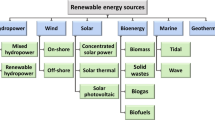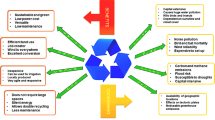Abstract
Due to the high rates of energy consumption and its impact on environment over the last decades, policy decision-makers are increasingly recognising the need to take actions that allow to address problems associated with the deployment of non-renewable resources and climate changes. One field of action has been the promotion of measures that contribute to improve energy efficiency of countries. The purpose of this study is to identify the main factors explaining changes in energy efficiency applying the multiplicative Log Mean Divisia Index decomposition method for a set of countries (Portugal, UK, Brazil and China) with different socio-economic background and energy mix. The results show that overall energy efficiency trends display different patterns between countries and the same happens within each country from a sectoral perspective. Major drivers of improvements of overall energy efficiency were the intensity effect and the affluence effect, whereas the driver that hampered those improvements was the energy consumption per capita. Some policy implications derived from the results achieved are: policy decision-makers should support measures that promote the adoption of energy-saving technologies resulting from new technological developments; policy measures should be directed to raise awareness of end-users regarding energy efficiency and energy conservation efforts; policy measures promoting economic growth through the development (or expansion) of sectors of activity that consume less energy can also be implemented; finally, policy instruments may also be used to reduce the costs of implementing energy efficiency and energy-saving measures to households and firms.
Similar content being viewed by others
Notes
The data was obtained from the United Nations’ National Accounts Main Aggregates Database (https://unstats.un.org/unsd/databases.htm).
References
Ang, B. W. (2004). Decomposition analysis for policymaking in energy: Which is the preferred method? Energy Policy, 32, 1131–1139.
Ang, B. W. (2005). The LMDI approach to decomposition analysis: A practical guide. Energy Policy, 33, 867–871.
Ang, B. W., & Liu, F. L. (2001). A new energy decomposition method: Perfect in decomposition and consistent in aggregation. Energy, 26, 537–548.
Ang, B. W., Zhang, F. Q., & Choi, K. H. (1998). Factorizing changes in energy and environmental indicators through decomposition. Energy, 23, 489–495.
Baležentis, A., Baležentis, T., & Streimikiene, D. (2011). The energy intensity in Lithuania during 1995–2009: A LMDI approach. Energy Policy, 39(11), 7322–7334.
Bhattacharyya, S. (2011). Energy economics—Concepts, issues, markets and governance. London: Springer.
Boeck, L., Verbeke, S., Audenaert, A., & De Mesmaeker, L. (2015). Improving the energy performance of residential buildings: A literature review. Renewable and Sustainable Energy Reviews, 52, 960–975.
Brown, M. A., & Wang, Y. (2017). Energy-efficiency skeptics and advocates: The debate heats up as the stakes rise. Energy Efficiency. https://doi.org/10.1007/s12053-017-9511-x.
Carmona, M. J., & Collado, R. R. (2016). LMDI decomposition analysis of energy consumption in Andalusia (Spain) during 2003–2012: The energy efficiency policy implications. Energy Efficiency, 9, 807–823.
Chai, K., & Yeo, C. (2012). Overcoming energy efficiency barriers through systems approach—A conceptual framework. Energy Policy, 46, 460–472.
Chan, D., Huang, C., Lin, W., & Hong, G. (2014). Energy efficiency benchmarking of energy-intensive industries in Taiwan. Energy Conversion and Management, 77, 216–220.
Charlita, L., Freitas, D., & Kaneko, S. (2011). Decomposition of CO2 emissions change from energy consumption in Brazil: Challenges and policy implications. Energy Policy, 39(3), 1495–1504.
DECC—Department of Energy and Climate Change. 2014. UK energy in brief 2014, United Kingdom.
EEA—European Environment Agency. (2013). Achieving energy efficiency through behaviour change: What does it take?, EEA Technical report No 5/2013. Luxembourg: Publications Office of the European Union.
Filippini, M., & Hunt, L. C. (2009). Energy demand and energy efficiency in the OECD countries: A stochastic demand frontier approach. CEPE Working Paper No. 68, Zurich.
Filippini, M., & Hunt, L. C. (2015). Measurement of energy efficiency based on economic foundations. Energy Economics, 52, S5–S16.
Frick, V., Seidl, R., Stauffacher, M., & Moser, C. (2017). Promoting energy-saving behaviour: Formal social groups as promising middle actors for municipal interventions. Energy Efficiency, 10(6), 1539–1551.
Gillingham, K., Newell, R., & Palmer, K. (2009). Energy efficiency economics and policy. RFF-DP-13, Resources for the Future, Washington.
Gillingham, K., & Palmer, K. (2013). Bridging the energy efficiency gap: Insights for policy from economic theory and empirical analysis. RFF-DP-13-02, Resources for the Future, Washington.
Guan, X., Xu, Z., & Jia, Q.-S. (2010). Energy-efficient buildings facilitated by microgrid. IEEE Transactions on a SMART GRID, 1(3), 243–252.
Guo, X., Lu, C., Lee, J., & Chiu, Y. (2017). Applying the dynamic DEA model to evaluate the energy efficiency of OECD countries and China. Energy, 134, 392–399.
IEA—International Energy Agency. (2015). International energy agency statistics. Energy Statistics. Available at: https://www.iea.org/statistics/statisticssearch/. Accessed 28 Nov 2016.
Inglesi-Lotz, R., & Pouris, A. (2012). Energy efficiency in South Africa: A decomposition exercise. Energy, 42(1), 113–120.
IPCC. (2015). Climate change 2014: Synthesis report. Geneva: IPCC.
Jaffe, A. B., & Stavins, R. N. (1994). The energy-efficiency gap: What does it mean? Energy Policy, 22(10), 804–810.
Lee, W. L., & Yik, F. W. H. (2004). Regulatory and voluntary approaches for enhancing building energy efficiency. Progress in Energy and Combustion Science, 30, 477–499.
Lima, F., Nunes, M. L., & Cunha, J. (2016b). Energy sector: A cross-country resource and impact decoupling analysis. In Proceedings of the 13th International Conference on the European Energy Market—EEM15, June 6–9, 2016, Porto, Portugal.
Lima, F., Nunes, M. L., Cunha, J., & Lucena, A. F. P. (2016a). A cross-country assessment of energy-related CO2 emissions: An extended Kaya index decomposition approach. Energy, 115, 1361–1374.
Lima, F., Nunes, M. L., Cunha, J., & Lucena, A. F. P. (2017). Driving forces for aggregate energy consumption: A cross-country approach. Renewable and Sustainable Energy Reviews, 68, 1033–1105.
Oikonomou, V., Becchis, F., Steg, L., & Russolillo, D. (2009). Energy saving and energy efficiency concepts for policy making. Energy Policy, 37(11), 4787–4796.
Oliver-Solà, J., Armero, M., Foix, B., & Rieradevall, J. (2013). Energy and environmental evaluation of municipal facilities: Case study in the province of Barcelona. Energy Policy, 61, 920–930.
Ouyang, J., Long, E., & Hokao, K. (2010). Rebound effect in Chinese household energy efficiency and solution for mitigating it. Energy, 35(12), 5269–5276.
Pereira, G., & Silva, P. P. (2017). Energy efficiency governance in the EU-28: Analysis of institutional, human, financial, and political dimensions. Energy Efficiency. https://doi.org/10.1007/s12053-017-9520-9.
Pereira, S., Ferreira, P., & Vaz, A. I. F. (2017). Generation expansion planning with high share of renewables of variable output. Applied Energy, 190, 1275–1288.
Ribeiro, F., Ferreira, P., Araújo, M., & Braga, A. C. (2014). Public opinion on renewable energy technologies in Portugal. Energy, 69, 39–50.
Saheb, Y., & Ossenbrink, H. (2015). Securing energy efficiency to secure the energy union. Joint Research Centre, European Commission.
Saygin, D., Worrell, E., Patel, M. K., & Gielen, D. J. (2011). Benchmarking the energy use of energy-intensive industries in industrialized and in developing countries. Energy, 36(11), 6661–6673.
Schubert, R. (2017). Purchasing energy-efficient appliances—To incentivise or to regulate? In K. Mathis & B. Huber (Eds.), Environmental law and economics. Economic analysis of law in European legal scholarship (Vol. 4). Cham: Springer.
Stadelmann, M. (2017). Mind the gap? Critically reviewing the energy efficiency gap with empirical evidence. Energy Research & Social Science, 27, 117–128.
Tan, B., Yavuz, Y., Otay, E., & Çamlıbel, E. (2016). Optimal selection of energy efficiency measures for energy sustainability of existing buildings. Computers & Operations Research, 66(2016), 258–271.
Udalov, V., Perret, J., & Vasseur, V. (2017). Environmental motivations behind individuals’ energy efficiency investments and daily energy-saving behaviour: Evidence from Germany, the Netherlands and Belgium. International Economics and Economic Policy, 14(3), 481–499.
Wachsmann, U., Wood, R., Lenzen, M., & Schaeffer, R. (2009). Structural decomposition of energy use in Brazil from 1970 to 1996. Applied Energy, 86(4), 578–587.
Wang, H., Ang, B. W., & Su, B. (2017). Assessing drivers of economy-wide energy use and emissions: IDA versus SDA. Energy Policy, 107, 585–599.
Wang, Z., Feng, C., & Zhang, B. (2014). An empirical analysis of China’s energy efficiency from both static and dynamic perspectives. Energy, 74, 322–330.
World Bank. (2015). World Development Indicators (WDI) Tables. Available at: https://www.worldbank.org/tables. Accessed 28 Nov 2016.
Wu, Y. (2012). Energy intensity and its determinants in China’s regional economies. Energy Policy, 41, 703–711.
Yoon, I., Lee, Y. S., & Yoon, S. K. (2017). An empirical analysis of energy efficiency measures applicable to cities, regions, and local governments, based on the case of South Korea’s local energy saving program. Mitigation and Adaptation Strategies for Global Change, 22(6), 863–878.
Zeshan, M., & Ahmed, V. (2013). Energy, environment and growth nexus in South Asia. Environment, Development and Sustainability, 15(6), 1465–1475.
Zhang, Y.-J., & Da, Y.-B. (2015). The decomposition of energy-related carbon emission and its decoupling with economic growth in China. Renewable and Sustainable Energy Reviews, 41, 1255–1266.
Ziolkowska, J. R., & Ziolkowski, B. (2015). Energy efficiency in the transport sector in the EU-27: Dynamic dematerialization analysis. Energy Economics, 51, 21–30.
Acknowledgements
This work has been supported by COMPETE: POCI-01-0145-FEDER-007043 and FCT—Fundação para a Ciência e Tecnologia within the Project Scope: UID/CEC/00319/2013.
Author information
Authors and Affiliations
Corresponding author
Rights and permissions
About this article
Cite this article
Cunha, J., Nunes, M.L. & Lima, F. Discerning the factors explaining the change in energy efficiency. Environ Dev Sustain 20 (Suppl 1), 163–179 (2018). https://doi.org/10.1007/s10668-018-0148-5
Received:
Accepted:
Published:
Issue Date:
DOI: https://doi.org/10.1007/s10668-018-0148-5










